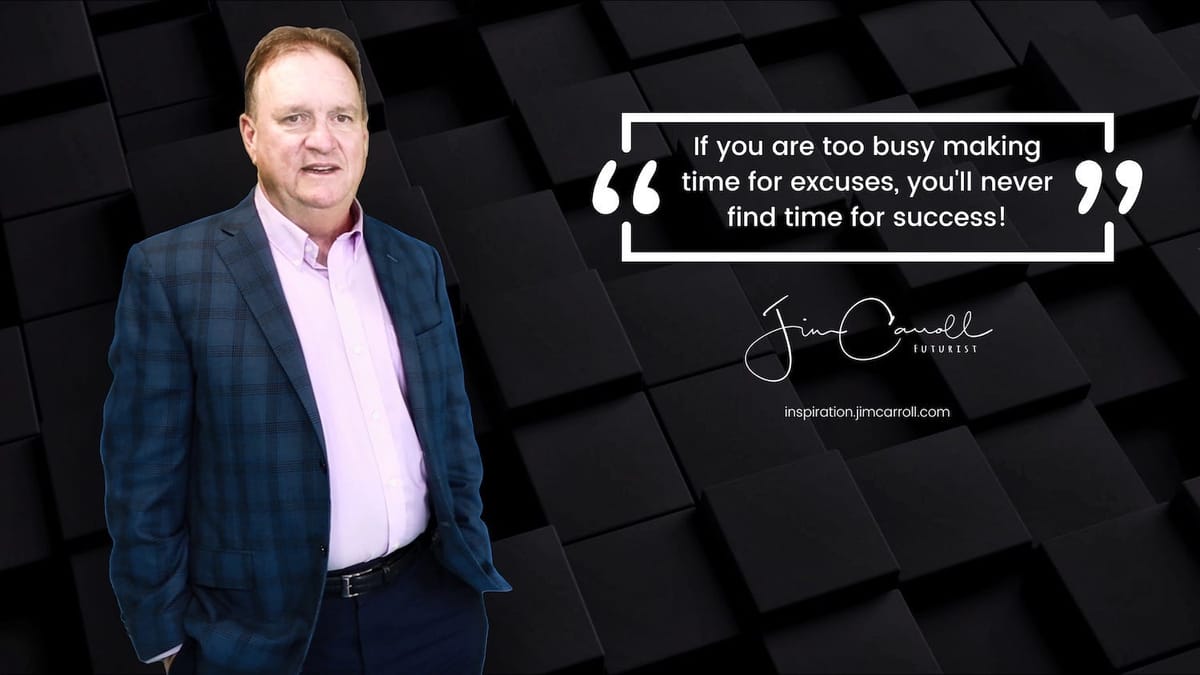Organizations fail because they have failure ingrained in their corporate culture - powered by the excuses they make for inaction!
Do you?
It can be difficult to try to be innovative in many organizations. People with an innovation-oriented mindset often find their enthusiasm destroyed when they approach senior management with an initiative. And when their effort is turned back, it can extremely frustrating! What happens is that a series of excuses are made as to why we don't need to focus on the future right now:
- we don't understand it, so we don't think we need to do it!
- maybe we shouldn't confront the tough issues right now
- we are too busy fighting fires - there's no time for anything else!
- we don't have the skill sets to deal with this!
- we haven't thought about this in our strategic planning process
- we don't have time to think about it...
- we don't have a budget
- what we've been doing all along is perfectly ok, isn't it?
- there's so much going on, and we don't know where it might fit in terms of priorities!
- and the worst? it's too far ahead of its time!
Of course, it's easy to take this wall of negativity and step back from the project and curb your enthusiasm -- and give up! But real innovators don't give up! They work to address organizational sclerosis that might be in place. What you should do is confront these excuses head-on: there are a variety of different reactions depending on the different excuses that are used:
- if they don't understand it, educate them! This might involve building a better business case for the initiative; bringing them up to date on the key business drivers and trends that require some bold steps and dramatic change.
- help them that those who tackle the tough issues usually win. This is a good time to put into perspective the concept of accelerating change. You need to make sure that the leadership team understands that everything around us today is changing faster than ever before, and will continue to do so: business models, methods of customer interaction, and new forms of competition. Business today is all about continually confronting a flood of tough issues; we should be bulking up our capabilities to deal with a world of incessant change.
- if the organization is always in fire-fighting mode, change the agenda. Maybe they won't be fighting as many fires over the long term if they have a clear view of the future, and have a strategy that aligns with that future. So rather than asking, "whoah, where'd that come from," they're asking "ok, what comes next, and what do we need to do about it?"
- skillsets don't give us the capability: That's a weak excuse: if there are shortfalls in certain key skills to deal with current business realities, deal with it and fix it fast.
- if it's not part of the strategic planning process, make it part of it. Every organization has multiple processes in which issues and activities rise to the top because they've been identified as fitting within the overall strategic plan. If yours isn't part of the plan, work to get it there.
- get people thinking about what comes next: Does the organization have a regular series of forward-looking leadership meetings? Does it take the time to assess the trends which might impact it on a 1, 2, 5, and 10-year basis? Is it busy looking at we have really spent a lot of time thinking about what comes next
- we don't have a budget for that! Following the process of getting the initiative into the strategic plan will help to lead to the next step: getting the project properly approved and funded within the overall budget process for the organization.
- make it clear that it isn't ok to keep doing the same thing that has been done in the past. You've got to clearly articulate the new threats the organization faces and the opportunities that it can pursue as a result of ongoing change.
- there's so much going on, and we don't know where it might fit in terms of priorities! This is a tricky one because, in this type of situation, it's pretty well certain that there is some weak management in place who doesn't know how to set a clear action plan that the team must follow. The best bet is to address the other issues on the list and work to put in place a clear business and strategic plan for your initiative, with sound business reasoning as to why it needs to be done.
- it's too far ahead of its time! Frame the future of the organization this way: do we want to always be fast followers, or do we truly want to be market leaders?
I will often note on stage that "we develop corporate cultures that stifle -- that kill our ability to try to do anything new....." That's what you've got to work to avoid -- it's not easy to do -- but absolutely necessary!

